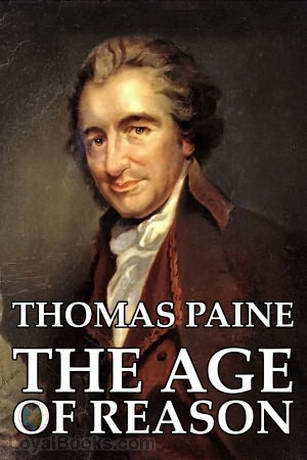
A Universalist book, The Age of Reason advocates for the existence of natural religion and challenges the structure of all organized religion. First written and distributed as pamphlets, the book was later published into two parts. Paine puts forward his personal beliefs, debating reason and revelation, while analyzing the Bible and the influence organized religion has on society. Exploring topics including natural religion, criticism of corrupt religious institutions, and distinction between rationality and blind faith in the supernatural, the book presents a guide for the conscious and free spiritual thinkers.
Following the style and influence of the Enlightenment ideals of logic and reason, the first part of the book focuses on the Paine’s personal creeds about God and the established religion which he believes is manipulated by organized religious institutions. He further goes on to exemplify his critical view of established religion by illustrating the inconsistencies in the Christian Bible, while examining both miracle and prophecy. He questions the legitimacy of the Bible as an accurate account of Christian beliefs and classifies it to be a word of man and not of God. Paine uses the book to outline his analytical objections to theism and as a means to support his belief in deism.
Distinctive for its clear and straightforward linguistic style, Paine’s political language was aimed to bring politics to a mass audience, not just the educated population. Incorporating rhetorical questions and repetition throughout the piece, Paine encourages the audience to independently complete the views and arguments he presents rather than impose his creeds upon them. The Age of Reason supports the idea that in order to discover the true grandeur of God, one should worship individually and without dictation from society. A compelling, meticulous and notable critique, Paine’s work is marked as a theological eye-opener and an insight into deism, whilst also regarded as a pervasive influence even in present secular society.

Other Audiobook
Audiobook: Conduct of Life
This is the best of Emerson’s later works, qualifying his earlier popular essays, series one
Audiobook: Short Science Fiction Collection 053
Science fiction is a genre encompassing imaginative works that take place in this world or
Audiobook: Theory of Moral Sentiments (First Edition)
“How selfish soever man may be supposed, there are evidently some principles in his nature,
Audiobook: Faust, Der Tragödie zweiter Teil
Faust widmet sich im zweiten Teil aktiv verschiedenen Tätigkeiten und entspricht damit einem Ideal der
Audiobook: Cambridge Medieval History, Volume 01, The Christian Roman Empire and the Foundation of the Teutonic Kingdoms
Volume 1: The Christian Roman Empire and the Foundation of the Teutonic Kingdoms “The present
Audiobook: History of and Suggestions in the Making of Biscuits, Quick Breads and Cake
This is a very short treatise on breads and cakes, published in 1921. The author
Audiobook: Turn of the Screw (version 2)
Henry James’ classic ghost story comprises the written testimony of a young governess, charged with
Audiobook: The God of All Comfort
This book is written to Christians who profess to believe the Bible as God’s revelation,
Audiobook: Tales of King Arthur and the Round Table (version 2)
The tales of King Arthur and his Knights are of Celtic origin. The Celts were
Audiobook: A New England Girlhood: Outlined From Memory
Lucy Larcom was an American poet, teacher, and mil-worker. According to Wikipedia: “Larcom served as
Audiobook: Collection of Ballads
This is a collection of ballads, edited, with an introduction and notes by Andrew Lang.
Audiobook: Dish of Orts: Chiefly Papers on the Imagination, and on Shakespeare
Readers of George MacDonald are used to his engaging story-telling, winsome characters, and simple theology